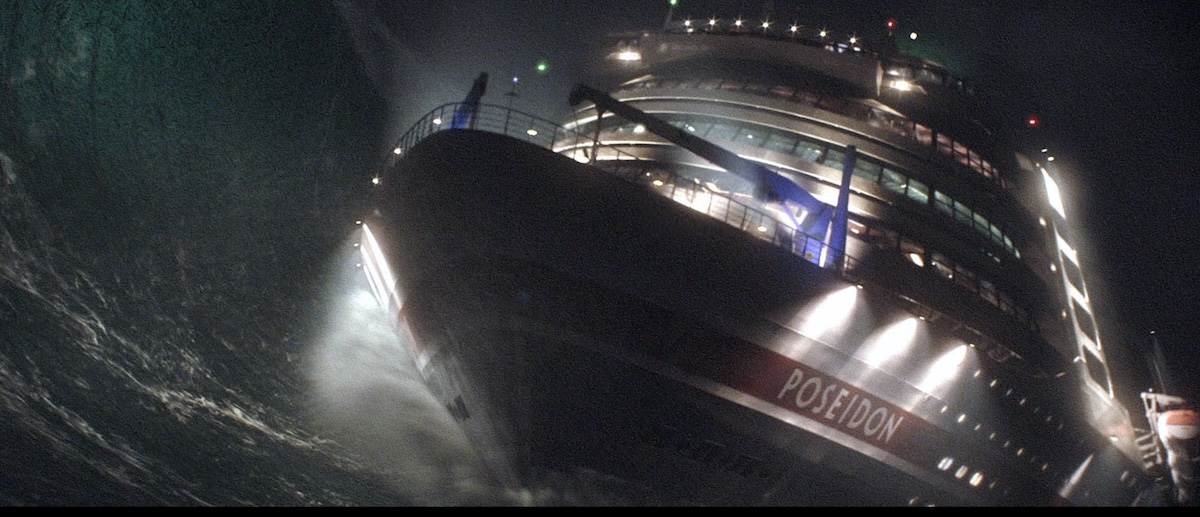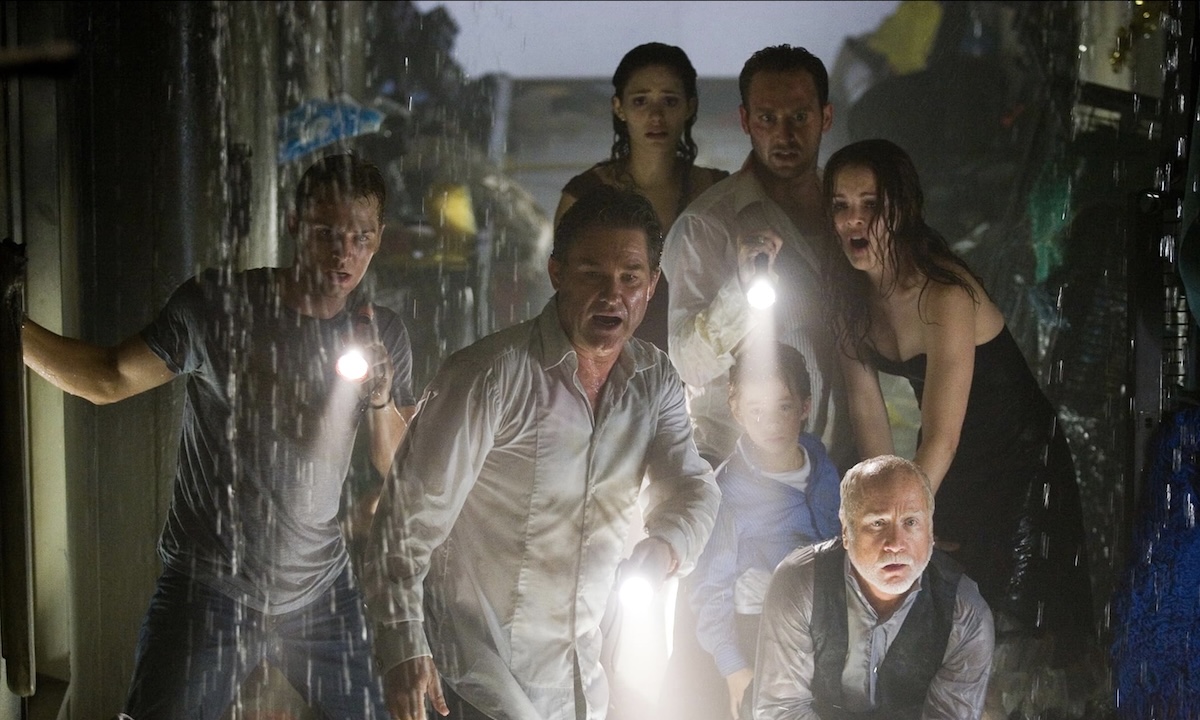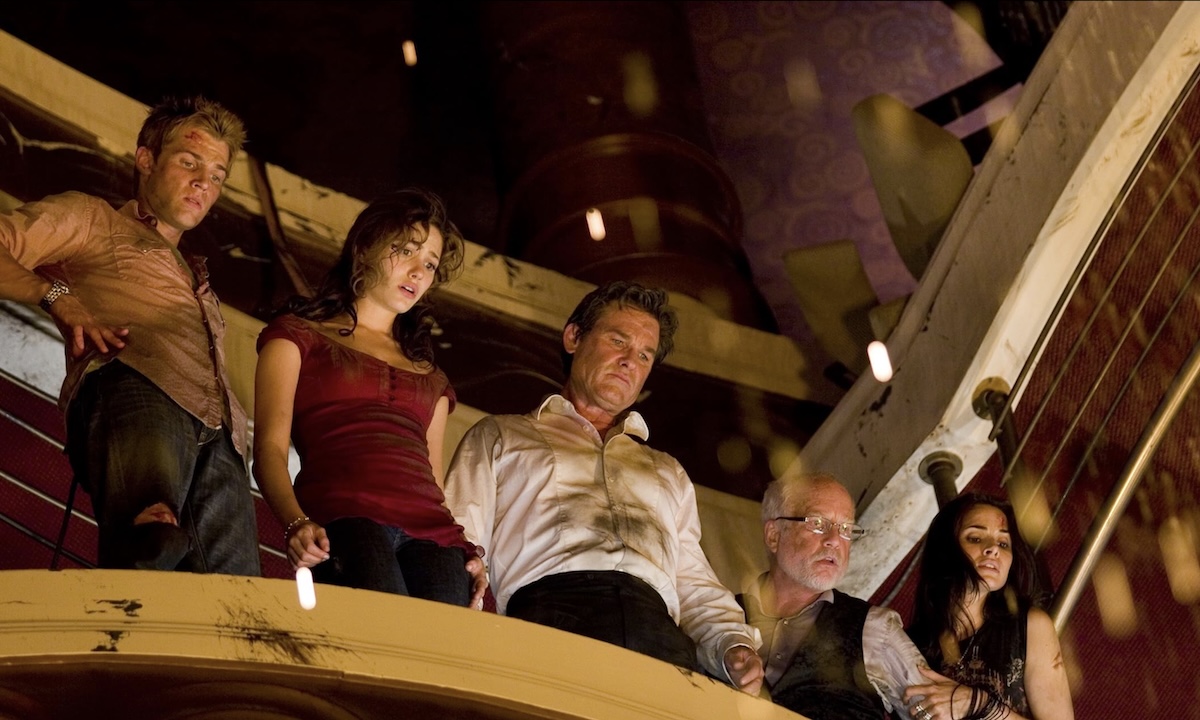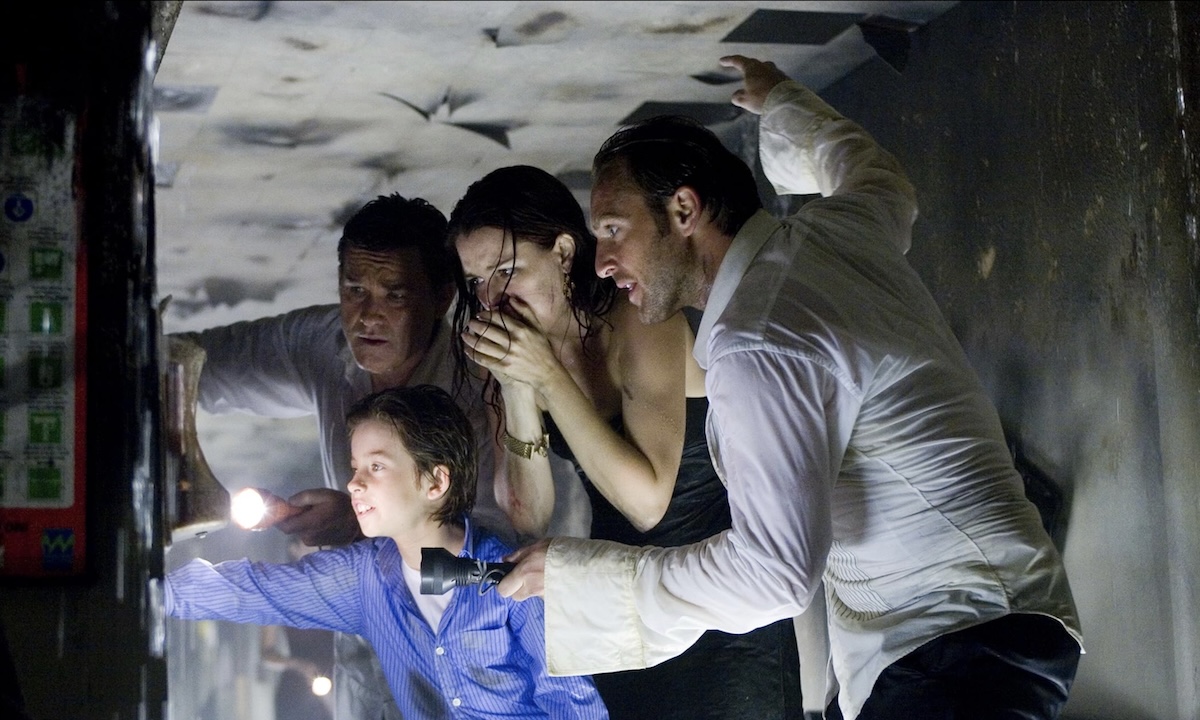POSEIDON (2006)
A packed cruise ship traveling the Atlantic is hit and overturned by a massive wave, compelling the passengers to begin a dramatic fight for their lives.

A packed cruise ship traveling the Atlantic is hit and overturned by a massive wave, compelling the passengers to begin a dramatic fight for their lives.

The 1970s ushered in a period of tumultuous transformation within American cinema. As the traditional studio system collapsed under the weight of its own irrelevance, the reliable formulas of previous decades no longer guaranteed box office success. Amid this uncertainty, George Seaton’s Airport (1970) emerged as an unexpected phenomenon, revealing the audience’s growing appetite for gargantuan disaster narratives wrapped in heightened drama and spectacle. However, it was The Poseidon Adventure (1972) that truly cemented the disaster flick as a dominant force in Hollywood.
While building upon Airport’s template, director Ronald Neame infused a blend of melodrama, technical ingenuity, and a premise rooted in plausible catastrophe that resonated deeply with audiences and critics alike. As one of the earliest and most successful examples of the disaster genre, the impact of The Poseidon Adventure was seismic. It altered the cinematic landscape irrevocably and eventually became the paradigm for a wave of successors including The Towering Inferno (1974), Earthquake (1974), and The Hindenburg (1975).

Perhaps it was inevitable that The Poseidon Adventure would eventually become another casualty of Hollywood’s obsession with brand recognition over narrative necessity. At the turn of the millennium, the industry had developed the rather dispiriting tendency of unearthing past intellectual properties ripe for reimagining, regardless of whether such endeavours served any artistic purpose. Whether through the soulless revival of cinematic staples like The Italian Job (2003), the nostalgic repackaging of vintage television shows such as Starsky & Hutch (2004), or the retooling of horror staples like The Omen (2006), the decade was saturated with emotionally hollow reinterpretations masquerading as homage. Wolfgang Petersen’s lavish yet lifeless update of Neame’s camp classic fits squarely within this movement. Poseidon offers an impressive visual spectacle but feels curiously weightless, even as its characters drown in meticulously rendered waves.
Set aboard the luxurious ocean liner SS Poseidon, the enormous cruise ship has taken a voyage across the Atlantic on New Year’s Eve. Celebrated as a marvel of modern engineering, the Poseidon hosts thousands of passengers ranging from the wealthy elite enjoying exclusive galas to everyday families and workers below deck. The festivities are abruptly interrupted when an enormous, towering wall of water suddenly emerges on the radar. Despite attempting to manoeuvre the vessel to safety, the rogue wave strikes with devastating force and capsizes the cruiser. As chaos erupts, Captain Bradford (André Braugher) commands the remaining survivors to congregate in the grand ballroom and wait for rescue. However, professional gambler Dylan Johns (Josh Lucas) decides to forge his own path to the surface after sensing the dangers of waiting in a structurally unstable room below the waterline. While making his way towards the ship’s keel protruding above the ocean, he is soon joined by a disparate group of reluctant survivors. Together, they must navigate the inverted labyrinth of the Poseidon, facing deadly obstacles and making harrowing sacrifices in a desperate bid for survival.

The talented ensemble brings dignity and conviction to their stock parts, but they struggle to make much of an impression with the material they’re working with. As the charismatic gambler thrust into reluctant leader of the expedition, Josh Lucas (Le Mans ‘66) is commendable as Dylan Johns. In a role that could have easily descended into generic machismo, the actor delivers a restrained performance underlined with a certain rugged intelligence. He navigates the character’s transition from self-interested loner to reluctant leader with admirable subtlety, suggesting emotional layers the script never explores. Elsewhere, Kurt Russell (The Thing) embodies the stoic archetype adequately as the former mayor of New York City and overprotective father, Robert Ramsey. There’s a sense that he’s striving to lend his grief-stricken father, struggling with familial tension, some semblance of depth. However, the screenplay reduces him to a symbol of paternal stoicism rather than a character you can emotionally invest in.
Wolfgang Petersen has demonstrated a remarkable affinity for the claustrophobic interiors of water-bound vessels as well as the seductive and terrifying duality of water. From the suffocating tension of Das Boot (1981) to the elemental chaos of The Perfect Storm (2000), the veteran director has long proven himself capable of orchestrating aquatic peril with chilling precision. Using a combination of digital and practical effects, Poseidon affords Petersen another canvas to showcase his aptitude for a series of meticulously choreographed set pieces, each more kinetically thrilling than the last.

The moment the rogue wave collides with the eponymous ship is simultaneously terrifying and mesmerising. As the luxury cruiser is upended and its passengers are cast into watery oblivion, viewers afflicted with thalassophobia may find themselves instinctively reaching for nonexistent life jackets. The survivors’ descent through the ship’s underbelly becomes a nightmarish labyrinth of claustrophobic service corridors and inverted luxury suites. The tension is relentless during sequences involving a cramped escape through a ventilation system slowly filling up with water and an underwater sprint towards the ship’s propeller chamber. A particularly gripping moment involving an intentional drowning is genuinely horrifying.
Though that might make for a sleek and relentless action spectacle, the deliberately taut 100-minute runtime sacrifices the emotional resonance and campy melodrama that gave The Poseidon Adventure its enduring appeal. A crucial element of any disaster flick is to have genuinely endearing characters and a narrative structure that allows emotional stakes to accrue naturally. However, rather than generating emotional investment through ensemble interplay and narrative depth, Mark Protosevich’s (The Cell) screenplay jettisons any meaningful development for instant calamity.
The luxury vessel is almost immediately overturned before the audience understands why they should mourn anyone’s imminent demise. The original provided the memorably idiosyncratic portrayals of Gene Hackman’s fiery preacher, Shelley Winters’ stoic heroine, and Ernest Borgnine’s curmudgeonly survivor. In their place are less endearing archetypes such as Josh Lucas’ brooding self-reliant loner, Kurt Russell’s stoically noble father, and Jacinda Barrett’s imperilled single mother. While each is provided with a perfunctory backstory, they are sketched with such mechanical exposition and narrative disinterest. What remains is a rather dreadful offering of formulaic personalities difficult to care about.

While Petersen largely forgoes character development in favour of mechanical spectacle, there is a modest attempt at anchoring the proceedings with a modicum of emotional resonance. During the opening act, the audience is introduced to the melancholic architect, Richard Nelson (Richard Dreyfuss). Amidst the clinking of champagne flutes and insufferable chatter between his business associates, he reveals that his relationship with a male companion has ended. “He’s met someone else,” he utters during a brief snapshot of a devastated man temporarily lost. It’s among the few instances where Poseidon momentarily slows down and acknowledges that human fragility might be as compelling as collapsing chandeliers. A director with greater sensitivity may have recognised this as an opportunity to explore the thematic resonance between emotional abandonment and physical survival. However, Petersen shows no interest in exploring the emotional landscape of a man whose personal shipwreck precedes the literal one.
Within the grand lineage of disaster cinema, Wolfgang Petersen’s modernised rendering of Paul Gallico’s novel makes a valiant attempt to reinvigorate the genre’s classical roots. While it neither dethrones the iconic gravitas of The Poseidon Adventure nor approaches the operatic emotionality of Titanic, it nonetheless asserts itself as a technically proficient and viscerally engaging spectacle. However, its insistence on momentary excitement comes at the expense of character development and thematic substance. It fails to recapture the emotional resonance that gave its predecessor an enduring appeal, resulting in a polished yet emotionally inert entry in the canon of disaster cinema.
USA | 2006 | 98 MINUTES | 2:39:1 | COLOUR | ENGLISH • SPANISH

Poseidon has been given a wonderful 4K restoration courtesy of Arrow Video, and showcases an immaculate 2160p Ultra HD transfer. The image is presented in its original 2.39:1 aspect ratio.
The most impressive aspect of this UHD transfer is the enhanced richness of the colour palette courtesy of Dolby Vision. The high dynamic range grading wonderfully intensifies the visual experience, particularly during the varied underwater sequences. Subtly graduated hues and luminous shafts of light piercing the murky depths of the Atlantic Ocean are rendered phenomenally. While explosive bursts of red and orange from ignited combustibles are equally well defined, they provide a vivid contrast against the darker environments. Black levels are satisfyingly deep, revealing an unobtrusive veneer of grain from start to finish, whereas flesh tones maintain a naturalistic appearance.
The image is deceptively sharp and contains an excellent amount of clarity with rendering that draws out plenty of delineation. Viewers will appreciate the transfer’s ability to showcase the intricate textures of furniture and décor during scenes set in the grand ballroom. Unfortunately, the superior resolution comes with a caveat. The improved image fidelity occasionally reveals the artificiality of certain digital elements. Most of these offences involve water and fire, which is nearly impossible to digitally replicate. Despite this shortcoming, fans will likely be pleased with the otherwise impressive presentation.
The 4K release of Poseidon also features two audio tracks with optional English subtitles. Arrow provides an immersive English DTS-HD 5.1 Master Audio and English LPCM 2.0 stereo. Although this release doesn’t enjoy a next-gen Dolby Atmos upgrade, the DTS-HD 5.1 Master Audio boasts excellent fidelity and dynamism. Action effects, including explosive bursts and shattering glass, pierce the soundscape and are precisely placed throughout the side channels for maximum effect, whereas discrete expansions in the overhead channels offer some really impressive surround activity, with electricity sparks and water leaks creating an immersive experience.
Dialogue isn’t prioritised and is noticeably quieter in comparison to the rest of the sonic mayhem. However, it remains discernible and is smartly prioritised at the front. The LPCM 2.0 mix is a monstrous track and threatens to blow the subwoofer once the boat capsizes. It embraces every eruption of water and explosion inside the ship with pristine clarity.

director: Wolfgang Petersen.
writer: Mark Protosevich (based on the novel ‘The Poseidon Adventure’ by Paul Gallico).
starring: Richard Dreyfuss, Kurt Russell, Emmy Rossum, Josh Lucas, Jacinda Barrett, Mia Maestro, Kevin Dillon, Freddy Rodriguez, & Andre Braugher.
